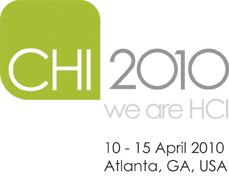| Contact: | Rosemary W. Stevens CHI 2010 Press Coordinator Ace Public Relations, Palo Alto +1 (650) 494-2800 acepublicrelations@gmail.com |
For Immediate Release:
Mankind’s Tricky Relationships with Robots
Expert Examines Trends in Robot Applications at ACM Human-Computer Interaction Conference
ATLANTA, GA (March 16, 2010) -- “Robots are now being used to harvest our fruit, pump our gasoline, assist doctors and surgeons, dispose of bombs, police us, entertain us, have sex with us and even kill us,” notes leading robotics expert Dr. Noel Sharkey. Sharkey, who is well known for his outspoken views in the media about new technology, will talk of the future benefits of robots, but will also warn of some of the dangers facing humanity in the next decade.
ACM’s Computer Human Interaction (CHI) conference, CHI 2010, has invited Dr.Sharkey to examine this trend, and the future application of service robots in a keynote speech at the Hyatt Regency Atlanta, Georgia, USA. The presentation, Doing what’s Right with Robots: An Ethical Appraisal of Robot Application, will be delivered on April 15th by Dr. Noel Sharkey, Professor of Artificial Intelligence and Robotics and Professor of Public Engagement at the University of Sheffield, UK.
“Robots can be benefit us in dull, dangerous and dirty work, however, we need to debate and decide appropriate applications of robot technology,” explains Sharkey. He warns that robots to mind our children and care for the elderly are in an advanced state of development, yet we still have no laws or regulations on how they may be used. “The military developments in robotics are returning to civilian life with a role in policing. We must be cautious not to tread on a slippery slope that could strip us of our privacy and human rights. We urgently need informed public debate to decide on appropriate policies.”
The annual conference on Computer-Human Interaction (www.chi2010.org) is the premier worldwide forum for exchanging information on all aspects of how people interact with computers. CHI 2010 is April 10-15, in Atlanta at the Hyatt Regency Atlanta. It offers two days of pre-conference workshops and four days of dynamic sessions that explore the future of computer-human interaction with researchers, practitioners, educators and students.
More than 2000 professionals from over 40 countries are expected at this year’s conference, which marks 28 years of research, innovation and development of the Computer-Human Interaction community. CHI 2010 is sponsored by the ACM Special Interest Group on Computer Human Interaction (SIGCHI). Organizations contributing to the financial support of the conference include Google, Inc.; Microsoft Corp.; the National Science Foundation (NSF), and Yahoo! Inc.
About SIGCHI
The ACM Special Interest Group on Computer-Human Interaction (www.sigchi.org) is the world’s largest association of professionals in the research and practice of computer-human interaction. SIGCHI serves as a forum for ideas on how people communicate and interact with computer systems. This interdisciplinary group of computer scientists, software engineers, psychologists, interaction designers, graphic designers, sociologists, and anthropologists is committed to designing useful, usable technology which has the potential to transform individual lives. SIGCHI has more than 60 local chapters for HCI professionals across five continents, publishes the SIGCHI Bulletin quarterly, and co-sponsors conferences and workshops to advance the field of computer-human interaction.
About ACM
ACM, the Association for Computing Machinery (www.acm.org), is the world’s largest educational and scientific computing society, uniting computing educators, researchers and professionals to inspire dialogue, share resources and address the field’s challenges. ACM strengthens the computing profession’s collective voice through strong leadership, promotion of the highest standards, and recognition of technical excellence. ACM supports the professional growth of its members by providing opportunities for life-long learning, career development, and professional networking.



